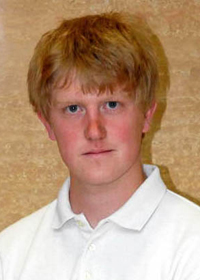 |
Andrew Block |
Established in 2001, the BRIN program was created to expose students to serious biomedical research, build a statewide biomedical research infrastructure between undergraduate and graduate institutions and to strengthen each undergraduate institution’s infrastructure and increase its capacity to conduct cutting-edge biomedical and behavioral research.
Today, we meet Andrew Block, one of the new BRIN scholars on campus.
What should we know about you?
I am a Colorado native with a variety of interests in addition to science. Since high school, I’ve been involved in the theater, both as a lighting technician and a set builder. I also love classical music, especially Stravinsky, and have played the viola for eight years. I currently play with the Kearney Symphony Orchestra, which is the oldest community orchestra in the nation. Camping and hiking are hobbies of mine and I have earned the Eagle Scout rank. Lately, I’ve been exploring the relationship between science and faith. I’m a quiet person of few words, and am glad that scientific writing only requires giving the facts!
What or who influenced your interest in science?
My interest in virology was sparked back in eighth grade when I read “The Hot Zone” by Richard Preston. Since then I have read numerous books about different viruses and how they affect the human body. The longer I study virology, the more interesting it seems to me.
One of my favorite science classes was biotechnology in high school. We did simple polymerase chain reaction and electrophoresis. I enjoyed thinking about how to design experiments to get the results you wanted and then deciphering the results that you actually got. I spent a lot of time working with the teacher and even received the outstanding biotech student award at the end of the year.
What is it about science that excites you?
Science is fascinating to me because we currently have less than a one percent understanding of our universe. The more we learn, the more we realize what we don’t know. It is a never-ending puzzle. As a scientist, I can a help fill in some of the gaps in our knowledge. It also excites me to know that the research that I am doing now will someday help unravel some of the mysteries about viruses.
Will you pursue a career in science? If so, what do you hope to accomplish?
I plan to pursue a career as a biological researcher. I would like to get a Ph.D. in virology. My dream is to work as a virologist in a lab that tries to find cures for the world’s deadliest viruses.
Why is it important to have programs like BRIN?
BRIN offers learning experiences that students might not get anywhere else. We have an opportunity to refine some of the skills we’ve learned thus far in lab classes while gaining hands-on practical research experience. We grow from networking with other students in the field and from having a mentor who can encourage us along a career path in research. A lot of students graduate from college without much of an idea about what to do with their degrees. Programs like BRIN give students insight into the “business and practical” side of science so that they have an idea of where they can go with what they’ve learned.